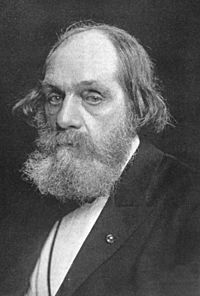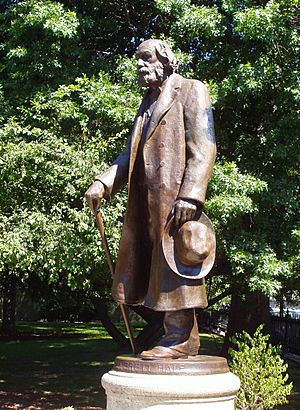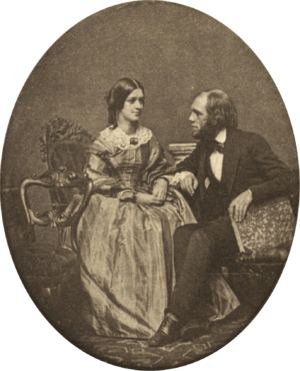Edward Everett Hale facts for kids
Quick facts for kids
Edward Everett Hale
|
|
|---|---|

From The Critic (1901)
|
|
| Born | April 3, 1822 Boston, Massachusetts, U.S.
|
| Died | June 10, 1909 (aged 87) Roxbury, Boston, Massachusetts, U.S.
|
| Education | Boston Latin School Harvard College (1839) Harvard Divinity School |
| Occupation |
|
| Children | nine, including Ellen Day Hale (daughter) and Philip Leslie Hale(son) |
| Parent(s) | Nathan Hale Sarah Preston Everett |
| Relatives | Lucretia Peabody Hale (sister) Susan Hale (sister) Charles Hale (brother) Edward Everett (maternal uncle) Nathan Hale (granduncle) |
| Signature | |
Edward Everett Hale (born April 3, 1822 – died June 10, 1909) was an important American writer, historian, and Unitarian minister. He is best known for his story "The Man Without a Country". This story was published during the American Civil War to support the Union side. Edward Everett Hale was also the grand-nephew of Nathan Hale, a famous American spy from the American Revolutionary War.
Contents
Life and Early Career
Edward Everett Hale was born in Boston, Massachusetts, on April 3, 1822. His father, Nathan Hale, was a newspaper editor. His mother was Sarah Preston Everett. Edward had several siblings, including Lucretia Peabody Hale, Susan Hale, and Charles Hale. He was also related to other important people, like his uncle Edward Everett, a well-known speaker and politician. He was even a distant relative of Helen Keller.
Edward was a very smart child. He showed amazing writing skills from a young age. He finished Boston Latin School when he was just 13 years old. After that, he went straight to Harvard College. At Harvard, he joined a group of students who loved literature. He won two special awards called Bowdoin Prizes. He also became the Class Poet. In 1839, he graduated second in his class. Then, he studied at Harvard Divinity School to become a minister.
Decades later, he remembered how new ideas about religion were taught there. He said that young people learned that humans are not completely bad. They were taught that people could achieve anything. These ideas made young New Englanders feel hopeful. They believed the next 50 years would bring big moral changes to the world.
In 1842, Edward Hale became a licensed Unitarian minister. In 1846, he became the pastor of the Church of the Unity in Worcester, Massachusetts. In 1852, he married Emily Baldwin Perkins. They had nine children together. Some of their children became famous, like their daughter Ellen Day Hale (a painter) and their son Philip Leslie Hale (also a painter).
In 1856, Hale left the Unity Church. He became the pastor at the South Congregational Church in Boston. He worked there until 1899.
A Famous Writer
Edward Hale first became well-known as a writer in 1859. He wrote a short story called "My Double and How He Undid Me." It was published in Atlantic Monthly magazine. He soon wrote more stories for the same magazine.
His most famous work was "The Man Without a Country." It was published in 1863 during the Civil War. The story was meant to encourage people in the North to support the Union. In this story, and others, he wrote so realistically that readers thought his tales were true. These stories made him a very important short-story writer in the 1800s.
Hale also wrote a science fiction story called "The Brick Moon." It was published in Atlantic Monthly. This story was the first known fictional description of an artificial satellite orbiting Earth. It might have even inspired Jules Verne's novel The Begum's Fortune.
In 1865, he was chosen as a Fellow of the American Academy of Arts and Sciences. In 1870, he became a member of the American Philosophical Society. Because he supported the Union during the Civil War, he was also honored by the Military Order of the Loyal Legion of the United States.
Social Work and Later Life
In 1869, Hale helped start a magazine called the Christian Examiner, Old and New. He became its editor. In 1870, he wrote a story called "Ten Times One is Ten." This story introduced a motto: "Look up and not down, look forward and not back, look out and not in, and lend a hand." This motto led to the creation of "Lend-a-Hand Clubs" and "Look-up Legions" for young people.
In 1881, Hale published another interesting story called "Hands Off." In this tale, a narrator travels through time to change past events. This creates a different future. This story makes Hale an early pioneer in science fiction and time travel stories.
In 1886, Hale started another magazine called Lend a Hand. He wrote many articles for different magazines throughout his life. He also wrote or edited more than sixty books. These books included fiction, travel stories, sermons, biographies, and history.
Hale stopped being a minister at the South Congregational Church in 1899. By the early 1900s, he was seen as one of the most important writers in the country. In 1903, he became the Chaplain of the United States Senate. This meant he led prayers for the senators.
Edward Everett Hale lived in the Edward Everett Hale House in Roxbury from 1869 until his death. He also had a summer home in South Kingstown, Rhode Island. He and his family often spent their summers there.
Hale died in Roxbury, Boston, in 1909. He was buried at Forest Hills Cemetery. Today, a life-size bronze statue of him stands in the Boston Public Garden to remember him and his work.
Beliefs and Impact

Edward Everett Hale was a strong leader with great ideas. He worked hard to improve American life for many years. He cared deeply about the anti-slavery movement, especially in Kansas. He also supported public education, including the Chautauqua adult-education movement. He was also interested in helping working-class families.
He published many different kinds of works. These included fiction, history, and biographies. He used his writings and the magazines he started, Old and New and Lend a Hand, to promote social changes. These changes included religious tolerance, the end of slavery, and better education for everyone.
Edward Everett Hale's famous story, “The Man Without a Country” (1863), begins with the sentence: “I was stranded at the old Mission House in Mackinaw, waiting for a Lake Superior steamer which did not choose to come.” Hale later explained that to write this story, he carefully studied how the United States acquired Louisiana.
See also
 In Spanish: Edward Everett Hale para niños
In Spanish: Edward Everett Hale para niños
- International Order of the King's Daughters and Sons
 | Charles R. Drew |
 | Benjamin Banneker |
 | Jane C. Wright |
 | Roger Arliner Young |


